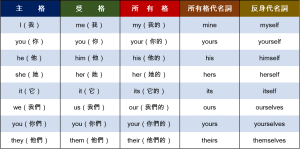人稱代名詞的格可分為主格、受格、所有格及所有格代名詞。

主格的功用是當主詞,包括I, we, you, he, she, it, they;
受格是當動詞或介系詞的受詞。包括me, us, you, him, her, it, them;
所有格當形容詞功用,後面接名詞,包括my, our, your, his, her, its, their;
所有格代名詞等於所有格+名詞,包括mine, ours, his, hers, theirs.
例:1. Nobody except him can solve our problem. (him當介系詞except之受詞)
2. Tom took an apple to school;he ate it at lunch time. (it當動詞ate之受詞)
3. Mary and Bob have their books;in other words, Mary has hers, and Bob has his.
反身代名詞包括myself, ourselves, yourself, yourselves, himself, herself, itself, themselves等,其要點如下:
1. 反身代名詞可以用來當加強語氣,加強主詞本身。
例:1. They themselves did it.=They did it themselves.
2. 反身代名詞可以作動詞或介系詞的受詞,但一定要滿足一個條件,即要等於主詞本身,若不等於主詞本身,則不用反身代名詞。
例:1. The old man was talking to himself. (等於The old man)
2. They disguised themselves so well that we could not recognize them. (themselves等於主詞They,them不等於主詞we)
